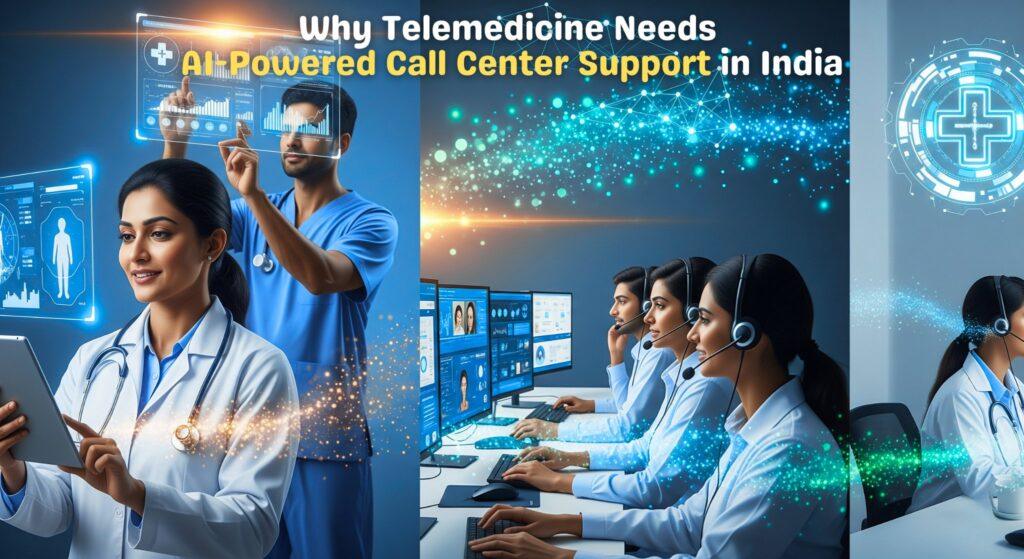
Why Telemedicine Needs AI-Powered Call Center Support in India
In India, telemedicine has shifted from being a convenience to a necessity. With the rise of digital consultations, home diagnostics, and online pharmacies, patients today expect healthcare that is not only accessible but also seamless. Hospitals, clinics, and health-tech startups are investing heavily in telemedicine platforms, yet one piece of the puzzle often remains under-optimized: patient communication and support.
This is where AI-powered healthcare call centers step in as the critical enabler of trust, efficiency, and continuity of care.
Telemedicine alone cannot handle the complexities of patient journeys—missed appointments, tech difficulties, billing queries, follow-up coordination, and multilingual support are frequent bottlenecks. Without a structured communication backbone, telemedicine risks becoming a fragmented experience.
In this blog, we’ll explore:
- Why telemedicine needs AI-powered call center support in India.
- How call center solutions enhance patient care and experience.
- Key benefits for hospitals, clinics, and health-tech founders.
- The future of AI in healthcare communication.
The Rise of Telemedicine in India
The COVID-19 pandemic accelerated telemedicine adoption by nearly a decade. According to NITI Aayog, telemedicine in India grew by over 500% between 2020 and 2022, and this growth shows no signs of slowing down.
Key drivers:
- Urban lifestyle & rural accessibility – Patients want convenient care without traveling long distances.
- Government push – The Ayushman Bharat Digital Mission (ABDM) promotes digital health records and teleconsultations.
- Health-tech startups – Companies like Practo, MFine, and Tata 1mg have set new benchmarks for digital healthcare.
Yet, the patient journey is rarely linear. A typical telemedicine patient might:
- Struggle with app installation or login.
- Face uncertainty around appointment timing.
- Need clarification on prescriptions or diagnostic reports.
- Require follow-ups or chronic care monitoring.
Without robust support, these friction points lead to dissatisfaction and drop-offs.
Why Telemedicine Alone Is Not Enough
While telemedicine platforms enable digital consultations, they often lack end-to-end patient engagement infrastructure. Some common pain points:
- High patient drop-off rates during onboarding or payment.
- Delayed responses to urgent queries.
- Language barriers for patients in tier-2 and tier-3 cities.
- Missed follow-ups, leading to poor treatment adherence.
- Administrative overload on doctors and nurses.
This is where AI-powered healthcare call centers become indispensable.
How AI-Powered Call Centers Transform Telemedicine
AI-powered call centers combine cloud telephony, machine learning, chatbots, and natural language processing (NLP) to deliver scalable, 24/7 patient support.
- 24/7 Multilingual Patient Assistance
- AI voice bots can handle basic queries in Hindi, Tamil, Bengali, and other regional languages.
- Ensures accessibility for patients across India, not just urban English-speaking users.
- Streamlined Appointment Management
- Intelligent IVR systems reduce wait times by auto-routing calls to the right department.
- AI reminders via SMS/WhatsApp lower no-show rates by up to 30%.
- Tech Support for Virtual Consultations
- Many patients, especially seniors, struggle with apps or video tools.
- AI-driven agents guide them through login, payment, and connectivity troubleshooting.
- Medication & Treatment Adherence
- Automated follow-up calls remind patients to take medicines or book follow-up tests.
- Chronic care patients (diabetes, hypertension) receive proactive engagement.
- Efficient Query Resolution
- AI chatbots handle FAQs (e.g., “Where is my lab report?” or “What’s the consultation fee?”).
- Live agents focus on complex queries, improving efficiency.
- Integrated Billing & Insurance Support
- Explaining coverage under Ayushman Bharat or private insurance.
- Handling claims-related queries without long hospital queues.
Linking to Patient Care:
How Healthcare Call Center Solutions Improve Patient Care in India
We’ve already seen that healthcare call centers go beyond just answering phones—they create a structured communication bridge between patients and providers.
In India, this directly improves patient care by:
- Reducing delays in treatment – No missed calls or lost follow-ups.
- Enhancing trust – Patients feel supported throughout their journey.
- Improving outcomes – Regular reminders improve medication adherence and recovery.
- Making care inclusive – Regional language support extends healthcare to Bharat (rural & semi-urban India).
👉 Read more here: [How Healthcare Call Center Solutions Improve Patient Care in India]
By combining telemedicine with AI-powered call centers, healthcare providers deliver continuous care, not just episodic consultations.
Benefits for Hospitals, Clinics, and Health-Tech Startups
- For Hospital Administrators
- Reduced patient complaints about communication gaps.
- Optimized doctor time (less admin, more care).
- Higher patient loyalty through better engagement.
- For Clinic Managers
- Affordable cloud-based call centers scale with patient demand.
- Automated workflows reduce front-desk pressure.
- Better patient retention in competitive urban clusters.
- For Health-Tech Founders
- Stronger customer trust for digital-first startups.
- Scalability across multiple cities with consistent support.
- Valuable patient data insights through AI analytics.
Technology Behind AI-Powered Call Centers
Modern AI call center platforms in India leverage:
- Natural Language Processing (NLP) – Enables voice bots to understand regional dialects.
- Predictive Analytics – Identifies patients at risk of non-compliance.
- Cloud Infrastructure – Scalable and cost-effective, especially for startups and clinics.
- CRM + EMR Integration – Unified view of patient journey for personalized care.
- AI-Driven Quality Monitoring – Ensures empathetic, consistent patient interactions.
Real-World Scenarios in India
- Telemedicine Startup in Bengaluru
- Faced 40% patient drop-offs due to appointment confusion.
- AI-powered call center reduced drop-offs to 10% by automating reminders.
- Hospital Chain in Delhi
- Implemented multilingual AI bots for outpatient teleconsultations.
- Improved patient satisfaction scores (NPS) by 35%.
- Diagnostic Network in Mumbai
- Used AI call center to follow up with patients on lab results.
- Increased repeat diagnostic tests by 20%.
Challenges and Solutions
- Data Privacy Concerns – Must comply with India’s Digital Personal Data Protection Act (DPDP 2023) and healthcare data standards.
- Integration Complexity – Choose vendors offering plug-and-play APIs with EMRs.
- Patient Trust in AI – Balance automation with live agent support for empathy.
- Cost Considerations – Cloud-based AI models make solutions accessible even for small clinics.
Future of Telemedicine + AI Call Centers in India
The next 5 years will see healthcare call centers evolve into AI-powered patient engagement hubs.
- Voice AI will handle 70% of routine telemedicine queries.
- IoT + Remote Monitoring will allow call centers to track vitals (e.g., blood sugar, BP) and alert doctors.
- Regional-first support will dominate, as 80% of patients prefer care in their native language.
- Predictive patient engagement will ensure proactive care, not reactive fixes.
For hospitals, clinics, and startups, this is not just an add-on—it’s a strategic necessity to stay competitive in India’s healthcare market.
Conclusion
Telemedicine has opened doors to accessible healthcare in India, but without AI-powered call center support, it risks leaving patients with incomplete experiences. From appointment scheduling to follow-ups, billing support to chronic care management, AI call centers ensure that every patient feels supported, heard, and cared for.
For hospital administrators, this means smoother operations and improved patient loyalty. For clinic managers, it ensures efficiency and cost savings. For health-tech founders, it becomes the backbone for scaling trust and patient engagement.
As India’s healthcare sector races towards digital maturity, the combination of telemedicine + AI call centers will define the future of patient care. The winners will be those who don’t just offer consultations but deliver end-to-end patient journeys powered by intelligent communication.


